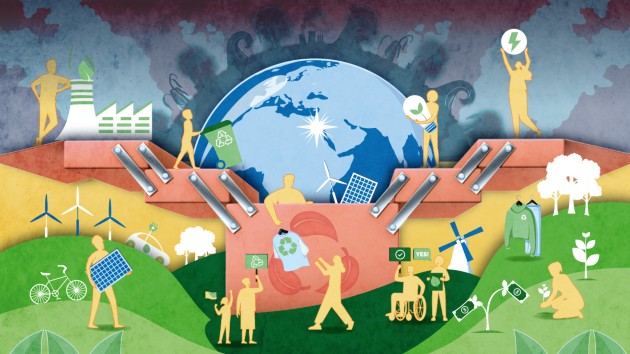Collections
Filters
-
Collection Type
-
-
Focus |
Synthetic biology
Since its inception almost 15 years ago, synthetic biology has evolved into a vibrant and productive field, owing in large part to the use of model microorganisms for the design, creation and implementation of both simple and more sophisticated biological systems. This Focus issue of Nature Reviews Microbiologypresents a set of specially commissioned articles that together chart the technological and cultural developments of the field, provide a framework for the use of emerging synthetic devices for microbial engineering, discuss the use of alternative microorganisms for industrial-scale applications and describe the first successful 'real-world' application that has been achieved. The Focus issue is accompanied by a joint Web Special withNature MethodsandNature.
-
Focus |
Cancer Immunology
The January 2012 special issue presents two important strategies for generating potent and lasting anti-tumor immunity. The first strategy is to subvert immune suppressive networks in the tumor microenvironment. The second strategy is to optimize conventional and anti-biological modalities to directly target tumor and adjacent tumor tissue, and mobilize and expand anti-tumor immunity in the tumor microenvironment which results in tumor eradication. Further background information on this important topic is available through the accompanying web focus which links to related articles from across Springer Nature.
-
Focus |
Helper T cell subsets: differentiation and function
Helper T cell heterogeneity was discovered two decades ago, initially with the designation of Th1 and Th2 cells, which are involved in immunity against intracellular and extracellular pathogens, respectively. Several years ago a third lineage was identified as the Th17 cells and several novel T cell subsets have since been found, including Treg and Tfh cells. The collection of articles presented in the May special issue and accompanying web focus summarize our understanding of the development and function of the T cell subsets in immunity and immune diseases.
-
Focus |
Children's Books
Books for young readers are the focus of this special Books & Arts section, and accompanying podcast. Expert reviewers, their children and their grandchildren weigh up the different approaches publishers are taking to communicating science to tomorrow's lab heads and policy makers. From pop-ups to how-to's, biographies to fiction, encyclopaedias to compendiums - find out how books are trying to hold their own against the myriad other information sources now available to budding scientists.
-
Focus |
Essays: Science and politics
In a series of nine weekly essays, experienced advisors on science policy, including to the US, UK and Swedish governments, reflect on the highs and lows of being at the intersection of science and society. Do scientists devalue their advice to government by emphasizing uncertainty, the series asks, or is there a need for greater humility when science meets public disquiet
-
Focus |
Fossil fuels
The exploitation of fossil fuels to satisfy the majority of our energy needs drives continued and often heated public debate. Naturepresents a focus on some of the many issues surrounding hydrocarbon fuel usage, from the economic, social and environmental impact to future energy resources.
-
Focus |
Future of Computing
In the last two decades advances in computing technology, from processing speed to network capacity and the internet, have revolutionized the way scientists work and many recent scientific advances would not have been possible without a parallel increase in computing power - but with revolutionary technologies such as the quantum computer edging towards reality, how long will the current synergy between computing and science last?
-
Focus |
Hidden treasures series
Every month throughout 2008 Alison Abbott looks into the holdings and history of one of Europe's unique small collections or scientific monuments off the well-beaten museum track. The series will, we hope, inspire a greater interest in where scientists have come from, and encourage those on the conference circuit with a few hours to spare to visit these 'hidden treasures'. Delight is guaranteed.
-
Focus |
Huygens on Titan
Saturn's moon Titan - larger than the planet Mercury and with an atmosphere - has always intrigued astronomers. Results exceeded expectations when the Huygens probe landed on the surface on 15 January 2005. This special Natureweb focus presents the latest findings alongside a comprehensive archive of papers about this fascinating moon. The sights and sounds of Huygens' incredible journey are also featured, including a brilliant descent animation. Image: ESA
-
Focus |
Ice Cores
Ice cores give a glimpse of the dramatic variations in climate that accompanied past ice ages. Even better, these frozen climate records can reveal much about the levels of atmospheric greenhouse gases while temperatures changed. Here Naturebrings together groundbreaking new sets of results from both polar regions together with previous classic papers and other ice-core related articles
-
Focus |
iPS cells
Recently scientists found that a special property of stem cells called pluripotency — the ability to renew and form all cells of the body — can be induced by introducing only four transcription factors into adult cells. This process creates powerful stem cells similar to embryonic stem cells. Now scientists are working to make the technique more efficient and safe, and are creating induced pluripotent stem-cell lines from individuals with diseases for use in drug screening and research into disease mechanisms.

 Climate change and human behaviour
Climate change and human behaviour